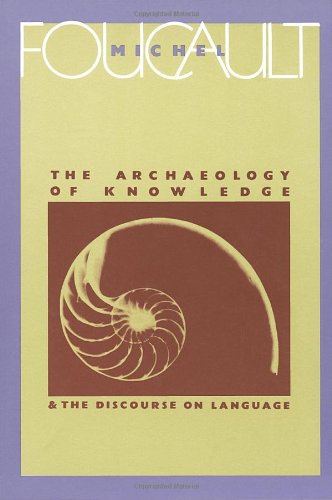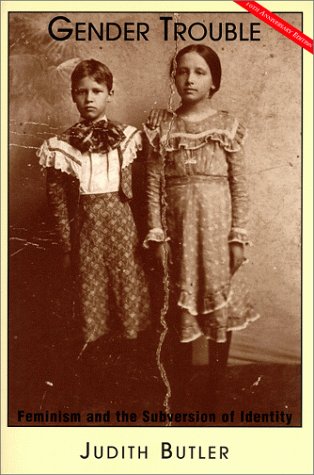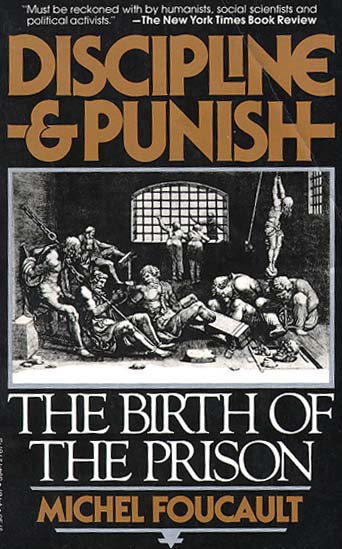Introduction

I intend this blog as a general neoreaction/political thought depository for the products of my mind. I won't go about presenting my views in any systematic way, though I may at some point endeavour to do that. However, I happen to think that the first place anyone should start, is here. I spent every evening of mine for about a month last year going through Mencius Moldbug's very long essays on a variety of topics (is there anything he doesn't cover?). Here, however, I would simply like to begin rather informally by presenting some of my thoughts on Foucault. I think he is sufficiently important to the Cathedral's own thought that a brief evaluation from a neoreactionary perspective is perhaps useful. There are some basic ideas that I think vibe quite well with neoreaction, but others that I think simply must be discarded. I must also admit that, unlike the works of Moldbug (or Marx, a matter for another time), I haven't read the entire corpus of his work, and thus consider myself an outsider to Foucauldian thought, and perhaps even unqualified to evaluate him. That being said, I can't see myself going through any extensive study of Foucault at any point in the future, so I'll go ahead with it now while he is still on my mind.
Impact

Foucault's legacy politically and academically cannot, in my opinion, be underrated. On the whole, I believe that his legacy has been a negative for philosophic thought, and also for the disciplines of sociology and anthropology. This is because Foucault shifted the aim of philosophical inquiry away from the evaluation of propositions for truth value, and towards the determination of the genealogy of a proposition. That is to say, he encouraged the investigation into why someone said something that they did, rather than dealing with statements as statements which carry with them truth or falsehood. Power-knowledge is Foucault's term for the political discourse of truth at any given time, which is informed, ultimately, by power episteme, as used in The Archaeology of Knowledge). In the sense that such things as discourse and religion, for Marx, are superstructural, and products of the material ownership of the means of production, Foucault places power in a similar place. Discourse is a product of power relations, it is not something that one need to evaluate logically. All modes of thought, or epistemes, for Foucault, are products of power relations.
Thus, where feminism or other such schools of thought cannot argue on strictly material or biological grounds for equality, they instead resort to the argument that gender (note the shift from discussing sex equality) is a social construct, a product of, perhaps, oppressive patriarchal institutions. Similar approaches are found throughout anthropology and sociology. There, history is not important, but genealogy, which is to say, the construction of perception of history in the mind of the subject. At risk of painting all humanities as useless, I must say that this is not the case, only generally the case. Any academic who dissents from the view that gender is socially constructed or might in any way suggest that colonialism was not inherently evil and constructed oppressive discourse and modes of knowledge must keep silent until after tenure is granted. A very difficult task indeed.
Thus, if we are to in any way function as an anti-Cathedral, we have to understand that the Cathedral, doesn't actually care about logical argumentation, evidence, or the cases that we make, instead, they want to know what makes us think the way we do? Clearly, it's going to be explained as a result of our racial privilege, our gender privilege, and our fear of having privilege and self-beneficial discourses exposed as oppressive. It doesn't have anything to do, in the eyes of the typical Cathedralite, with the fact that we actually may have come to our conclusions through following arguments to their logical conclusion, or that we we making inferences about the world around us, which we see crumbling as it follows the logic of democracy (or preferably "Дерьмокра́тия").

As far as Foucauldian thinking goes, it's fairly unlikely that the typical academic influenced thereby, directly or by proxy (as naturally happens even to those who haven't heard of him), is going to be the least bit moved by our argumentation. Take for instance the fairly orthodox Foucauldian Judith Butler's treatment of "biological" responses to her own argument of gender as a form of performativity, in Gender Trouble. It amounts to the strawman of the problem that there has, as of yet, not been found any "gender gene." Clearly, Butler doesn't understand genetics, and the proposition in the first place would be taken fairly quickly as pseudoscientific by anyone who did. This doesn't matter for her however, since scientific (or scientistic) thinking is apparently an oppressive tool of the patriarchy, and thus its conclusions matter little. Butler would be an interesting topic for a future post, and there is a lot to go into with regards to both her legacy in the Cathedral and her impact on the humanities in general, but suffice it to say, when we are talking to even the most intelligent Cathedralites, we might as well be talking to a brick wall. We are bound to have our arguments overlooked and dismissed for the fact that we must all simply be nerds who want to rule the world. Not that attacking the Cathedral head on is in any way something I am recommending.
It should be said that Foucault's approach to knowledge construction is fairly popular, and other thinkers have expressed similar sentiments. Bourdieu's notion of habitus comes fairly close. Habitus and episteme or power-knowledge differ in that a habitus is the mode of social behaviour for a certain group, but individuals may have a variety of habiti. Power-knowledge on the other hand is the discourse prevalent in society at any given time, through which one thinks, speaks and acts. There is no independent subject for Foucault, only power determined discourses. Both are epistemologically anti-individualistic, and posit that a person is entirely socially conditioned. This is obviously much more sophisticated, but the approach of reducing propositions to the product of a person's background, despite simply being fallacious from the perspective someone who respects logic, is rather prevalent in society and the Cathedral at large. One might even say that it is the episteme. Just take for instance the typical reaction to neo-reaction in the news.
Strengths and Weaknesses of Foucault for Neoreactionary Purposes
Moldbug's model of the Cathedral can easily be thought of as similar to Foucault's model of power determining the dominant discourse. The diagram below this paragraph illustrates Moldbug's concept from here, which I shall not elaborate presently (I shall simply assume familiarity of the reader with the concept at hand). Any notion of political power-knowledge, and indeed any political habitus, is indeed compatible with the conception of the Cathedral. A Foucauldian would likely not dispute that this structure does exist, but would certainly argue for a greater emphasis on roughly Marxist, perhaps Frankfurtian, grounds, that the bourgeoisie at large is a greater influence than these rather clear cut power-wielding institutions. The judiciary and media, for instance, are not agents, since they are determined, in Foucault's thought, by greater power-knowledge discourses. Similarly, the individual, who in the diagram below, is shown to have their social norms determined by the Cathedral, is not totalised as a product or entity defined in relation to the episteme in question as he is in Foucault's thought. For Foucault, the individual and subject are defined by how institutionalised they are. The prisoner and patient are more individualised than the sane man. By and large, the Austrian economics assumed by Moldbug (which I'd also hold to be the preferable economic theory along with cameralism etc.), presupposes individual agency. A social entity is simply a product of individual agents, rather than vice versa. Social norms can be said to be determined by the Cathedral simply by definition, i.e. social norms.


For Foucault, the modern soul is defined by power, and the body is defined by the soul, a socially determined self-identity. The body is prison to the soul for Foucault, and not vice versa. That souls are determined, I wouldn't dispute, but that scientific discourse is contingent, and therefore biological claims about the body are irrelevant, I would. Discourse on the objective world fundamentally is not compatible with that of the subjective world. A subjective perspective, an inside out perspective, fundamentally cannot be mixed with the outside in, or scientific, perspective. The two worlds tend to work by their own logic, and it is attempts to explain one using the other that gets us into such difficulties. The scientific method is necessarily a matter of personal and collective acceptance in the Kuhnian sense, and I intend to write on that subject in the future, but the world of the scientific method simply is unaffected by critical social discourse of the Foucauldian hue. Likewise, subjective experience is not discussable from the objective perspective, not just because it cannot be observed by anyone more than one person, i.e. the subject, but because it isn't talking about objects, the material world, which is defined by that which has shape and extension. So, my soul, contingent entity as it may be, no matter how much I attempt to project my perception of it onto my body, is not going to change my body. My body isn't defined by power, nor, fundamentally, are economic conditions - they are defined by rules governing that which has shape and extension, i.e. physical laws. Si eppur muove. Economic conditions and bodily conditions are contingent in certain respects, such that agency has an influence on them. Does power influence perceptions? Yes. Does this mean that scientific inference with due admission of the influence of feeling and perception upon sensory experience is meaningless except as a product of social relations? Obviously not. Does it mean that propositions in general are meaningless except as a product of social relations? Even more obviously not. Does this mean, to limit the scope of my claim, that coercion and power are not expressed in any way upon personal experience and don't have an influence upon personal action in a panoptic way? No. The influence, I think, is immense. The problem, for Foucauldian thought, is not whether or not gazes have a coercive power, but what kind of epistemological and metaphysical claims are being implied -- some of which, if taken to their logical conclusions, result in absurd dismissals of perfectly reasonable arguments, which is specifically the message I am trying to get across here. Power and coercive gazes do have immense effect upon subjectivity and upon agency, but there's little point in reducing the whole social and political world to them. Importantly however, the Cathedral does engage in coercion in a Foucauldian way, big time, and it makes the old days of torture seem preferable to the days of constant surveillance that we currently live in.
Some other, perhaps, minor comments on Foucault. Foucault claims that from the 18th to 20th centuries, the rise of the bourgeoisie and the regimentation of daily life lead to discipline as opposed to the kind of torture employed by earlier governments in Discipline and Punish. If this is true, it may be argued that democratic regimes require more control, and more maintenance of social behaviour, more regimentation, and more carceral creation of delinquency than monarchical regimes. Democracy inherently leads to greater requirements for control and power. While ultimately the civil service can manage a country without election, election unreigned results in anarchy. The Cathedral is the institution which maintains this careful balance, but inherently must expand (read, become left-wing), leading to greater and greater economic and administrative incompetence. That the bourgeoisie in particular is to blame is clearly questionable, as the class distinctions laid out by Marx are fairly inadequate reflections of reality. To be clear however, Foucault is not making arguments about the Marxian economic claims of exploitation that Marx made.
Perhaps to be nit-picky about Discipline and Punish, it is questionable that individuality in the Foucauldian sense, i.e. deviance warranting incarceration and discipline, is actually virtuous. An issue that Foucault does not deal with is the actual effectiveness of different forms of punishment at dealing with crime. Fundamentally, this brings us back to the main issue that Foucault has with propositions and truth value. Without being concerned for truth value, such matters are never taken seriously by Foucault. This topic was dealt with quite well in Peter Hitchens' A Brief History of Crime.

No comments:
Post a Comment